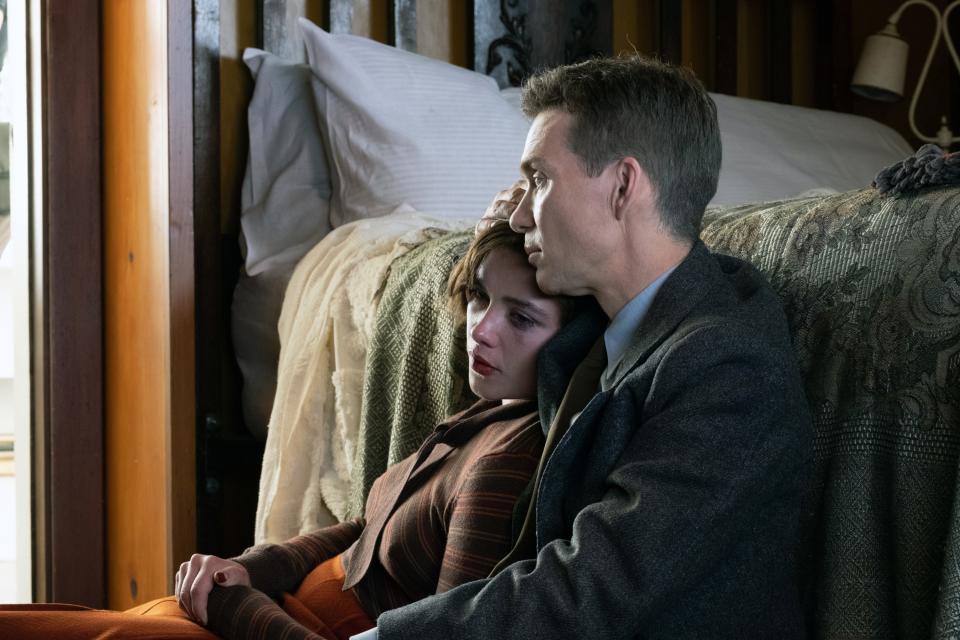2024 Oscars: Best Original Score Predictions

Nominations voting was from January 11–16, 2024, with official Oscar nominations announced on January 23, 2024. Final voting is February 22–27, 2024. And finally, the 96th Oscars telecast will be broadcast on Sunday, March 10, and air live on ABC at 8 p.m. ET/ 5 p.m. PT. We update predictions throughout awards season, so keep checking IndieWire for all our 2024 Oscar picks.
The State of the Race
The Oscar nominees leading the way for original score are “Oppenheimer,” (Ludwig Göransson), “Killers of the Flower Moon,” (the late Robbie Robertson), “Poor Things,” (Jerskin Fendrix), “American Fiction” (Laura Karpman), and “Indiana Jones and the Dial of Destiny” (John Williams).
More from IndieWire
Sundance 2024 Sales So Far: Netflix Acquires Audience Award-Winning Doc 'Daughters'
Robert Downey Jr. Says Margot Robbie Isn't 'Getting Enough Credit' for Leading 'Barbie'
“Oppenheimer,” “Killers of the Flower Moon,” and “American Fiction” also scored nominations from The Society of Composers and Lyricists” (the SCL awards to be held February 13 at the Skirball Cultural Center).
It’s a two-film Oscar race between “Oppenheimer” and “Killers of the Flower Moon.” Oscar winner Ludwig Göransson (“Black Panther”) is the frontrunner for “Oppenheimer,” in which he brilliantly underscores the intensity of J. Robert Oppenheimer’s (Cillian Murphy) conflicted life as the “father of the atomic bomb.” Robertson is the sentimental favorite for “Killers of the Flower Moon,” his final score that evocatively taps into his musical Native American heritage.

For Christopher Nolan’s “Oppenheimer,” Göransson wrapped his crucial theme around Murphy’s nuanced performance. That meant reflecting the mood of every emotion surrounding his obsession with quantum physics, the pressure to build the bomb to end the war, the fear of ending the world, and the aftermath of the war and the ensuing Cold War nuclear arms race. It all began with a solo violin, at the director’s request, which the composer transformed into a series of romantic, manic, neurotic, or horrific musical changes throughout Oppenheimer’s journey. By contrast, he used a harp to underscore the Salieri-like rival, Admiral Strauss (Robert Downey Jr.). The hardest part was actually composing suites for the parallel courtroom dramas.
Robertson’s career-defining score for “Killers of the Flower Moon” caps his special collaboration with Martin Scorsese. Their association began with “The Last Waltz,” the farewell concert of The Band filmed by the director in 1976, and continued with Robertson serving as musical consultant, soundtrack supervisor, and composer. For this celebration of the Osage tribe in Oklahoma in the 1920s, when they were systematically murdered for their oil-rich land and accumulated wealth, Robertson’s score “pounds along with the beat of drums and shakers, chords splashing on acoustic and electric guitars, accented with banjo twangs and the birdlike cries of various flutes.”
Eclectic rock musician-composer Fendrix makes his film score debut with Yorgos Lanthimos’ “Poor Things,” and his dissonant and melodic fusion perfectly captures the delirious state of mind of Emma Stone’s Bella, who’s reanimated by unconventional scientist Baxter (Willem Dafoe) with the brain of her unborn child, and is transformed into a Victorian free spirit in this “Frankenstein” gender-bender. He creates biomechanic music with woodwinds, pipe organs, uilleann pipes (similar to Irish bagpipes), a lot of synthesized breath, and vocals to evoke a childlike sense of wonder and tactile garishness and poisonous textures.
Karpman brought her extensive jazz expertise to Cord Jefferson’s “American Ficton,” the satire concerning “Black” entertainment’s tired and offensive tropes. It’s about Thelonious Monk Ellison (Jeffrey Wright), an out-of-touch novelist who anonymously mocks the state of “Black” culture, and ironically becomes a celebrity. Karpman focuses on two themes: “Monk’s Theme,” which plays with the craggy edges of both the protagonist and his musician namesake, and the “Family Theme,” which cradles the contours of love and harmony in sync but not always played perfectly together.
Williams surprisingly scored his record-breaking 49th nomination for “Dial of Destiny,” in which he hit all the right emotional musical moments for Indy’s (Harrison Ford) final adventure. The elderly archaeologist struggles to find his heroic place in a world that has passed him by, haunted by demons from the past, and Williams balances the familiar iconic themes with new ones built around his mood swings and relationships with Marion (Karen Allen) and goddaughter Helena (Phoebe Waller-Bridge).
Nominees are listed below in order of likelihood they will win.
Contenders
“Oppenheimer” (Ludwig Göransson)
“Killers of the Flower Moon” (Robbie Robertson)
“Poor Things” (Jerskin Fendrix)
“American Fiction” (Laura Karpman)
“Indiana Jones and the Dial of Destiny” (John Williams)
Best of IndieWire
2023 Emmy Predictions: Who Will Win at the Primetime Emmy Awards?
2023 Emmy Predictions: Outstanding Documentary or Nonfiction Special
2023 Emmy Predictions: Outstanding Documentary or Nonfiction Series
Sign up for Indiewire's Newsletter. For the latest news, follow us on Facebook, Twitter, and Instagram.

 Yahoo News
Yahoo News 
